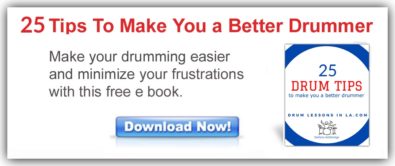Performing in front of a crowd can be one of the most exciting things a musician can do but for some, performing in front of others can produce feelings of terror and anxiety. Some jitters are to be expected and even good for your performance but major stage fright can be debilitating and at the least can cause you to lose focus and concentration while performing. If you have experienced any amount of stage freight, you are not alone. Even the most skilled and experienced performers report having to battle stage fright. Here are some strategies and thoughts on what you can do to deal with it.
PRACTICE
Make sure you are well practiced with the music you’ll be playing. The more you practice the music, the more confidence you’ll have in performance. (That also goes for playing your instrument in general). Don’t overdo it, but play through the songs until you can perform them easily. If your performance or audition involves composing something on the spot, even improvisation can be practiced.
Simulate the environment you’ll be performing during your practice. If you perform with a lot of energy and jump about, practice that way. If you wear certain stage clothes, make sure you practice in those clothes before the gig.
The main difference between practicing at home and performing at a live venue is that there is an audience there (duh). You can practice playing in front of people. Invite friends over to your rehearsal space and play for them or go to local open mic jams in the area and play.
Record your practices with your phone video camera or other device. That will also get you used to performing when “someone” is watching.
It might help to wear sunglasses at your first couple of performances to help you get started. Overall though, I think your audience will experience a better show if they can see your full facial expressions.
PREPARATION
Make sure you have everything you need before you get to the gig or audition. Forgetting something adds to your nerves. Make a checklist of everything you need and make sure you have everything with you before you leave. Give yourself plenty of time to get there so that you are not in a rush to get to the show and in a rush setting up.
Take deep, slow breaths and go over the show mentally before you go on. Knowing that you have a plan for how you want things to go will help to relieve anxiety. I’m all for watching the other bands you play with, but if it will cause you anxiety at your show, avoid watching the bands that go on before you to avoid needless comparisons between performers. It can help to watch some funny or amusing Youtube clips to take your mind off of things. Some form of physical exercise like running or doing some push-ups can also alleviate stress. Just don’t overdo it right before you go on.
ATTITUDE
Think about the following things before your next performance.
* Music is about the emotion you convey through your instrument. Some of the greatest performances are not technically perfect. Don’t put unnecessary pressure on yourself to be perfect.
* Remember when you first decided to play your instrument and how cool you thought it would be to be the musician playing on stage. Think about how far you’ve come musically from that day and that you are getting the chance to realize many people’s dream.
* Don’t make the performance about you. Get out of the way and make it about the music. Think of what you do as giving to your audience. Some may not like what you have to give but that is to be expected. (I’m sure you can think of some bands or artists that you don’t care for). Give a gift to people that like your music.
——
The more you play in front of an audience, the better you get at it. If you do these things mentioned consistently, you’ll find the stage fright will lessen over time. Remember to have fun.

